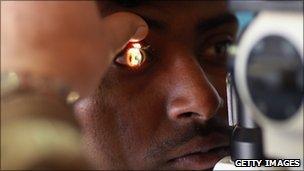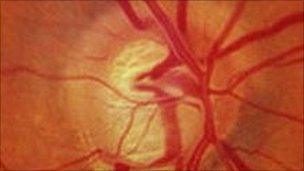Cardiff expert's ethnic eye test 'catastrophe' warning
- Published

Hundreds, if not thousands, of people are going blind unnecessarily, says Prof Tim Wess
An expert says the poor take up of free eye tests in Wales by people from ethnic minorities is leading to unnecessary blindness.
Research suggests black minority and ethnic (BME) groups are up to six times more likely to suffer conditions which could lead to blindness, but three times less likely to seek treatment.
Prof Tim Wess said this must change.
"It's no exaggeration to say that we're teetering on the brink of a health care catastrophe if nothing is done."
"When diagnosed early, the most common eye complaints suffered by people belonging to BME groups - such as glaucoma, diabetic retinopathy and cataracts - are all eminently treatable and manageable, if not entirely curable," said Prof Wess, head of the school of optometry and vision sciences at Cardiff University.
"The sad thing is that hundreds, if not thousands, of people are going blind unnecessarily, when first-rate treatments are available free of charge on their doorsteps."
People from a southern Asian background are six times as likely to develop diabetic retinopathy - a diabetic eye disease which can cause blindness.
African/Caribbean groups are not only three times more prone to diabetic retinopathy, but also have triple the chance of contracting glaucoma, a group of eye conditions in which the optic nerve is damaged.
However, despite at-risk groups having access to free eye tests since 2000, and Wales enjoying among the best optometry and ophthalmology services in the UK, take-up of preventative care remains unaltered.
The reasons for the higher instances of certain eye complaints among black minority and ethnic groups are varied.
For example, southern Asian people are more susceptible to diabetic retinopathy owing to a genetic inability to produce the amount of insulin required for a high-sugar, high-dairy western diet.
Similarly, the traditional Somali diet, rich in meat protein and starchy carbohydrates, is well suited to an active life in Somalia, but is too rich for the more sedentary jobs found in Wales.
People from an African/Caribbean background in general are at greater danger from glaucoma because of their thicker corneas, although stress and economic deprivation are also thought to be risk factors, in common with all ethnic groups.

People from a southern Asian background are three times more likely to contract glaucoma
However, very little is understood about why at-risk communities are so reluctant to seek help.
Prof Wess is so concerned that he has formed Megafocus (Minority Ethnic Groups Association for Ophthalmic Care Uptake and Service Improvement in Wales), bringing together health care professionals, community leaders and politicians, to spread the word about preventative medicine.
"Our early indications have been that there are as many reasons for staying away as there are people with sight problems. There's the obvious language barriers and lack of access to information, but it's more complex than that." he said.
"Many people we've spoken to are simply confused between opticians, optometrists and ophthalmologists. They weren't aware that they could access a free sight test and have problems diagnosed by an optometrist at any high street opticians, without a referral from a GP.
"Issues of males examining females, a fear of officialdom and a perception that sight problems diminish men's masculinity were all also common concerns.
Ibrahim Harbi, national coordinator for the Somali Integration Society, said treatment needs to be sensitive to the individual's needs, and that reluctance to seek help was not exclusively an ethnicity issue.
"It's not just with issues of eyesight, we see the same with cancer treatment, heart disease, dental care, and on and on," he said.
"We try to counter the Somali community's fears and concerns by promoting information through word of mouth and workshops in our mosques, but quite often we ourselves aren't being provided with the information from health care providers, which we can then pass on to our members.
"And there definitely is a nervousness with some people, especially ladies with a fear of being examined by men," Mr Harbi said.
Prof Wess's warning follows a decade of improvements in eyesight care provision in Wales.
In 1999 Wales was criticised for its lack of pre-emptive screening in a joint report by Moorfields Eye Hospital and the Royal National Institute for the Blind (RNIB).
Since £79m has been invested, giving Wales the shortest waiting times, lowest consultant-to-patient ratio, best patient outcomes and widest access to screening in the UK.